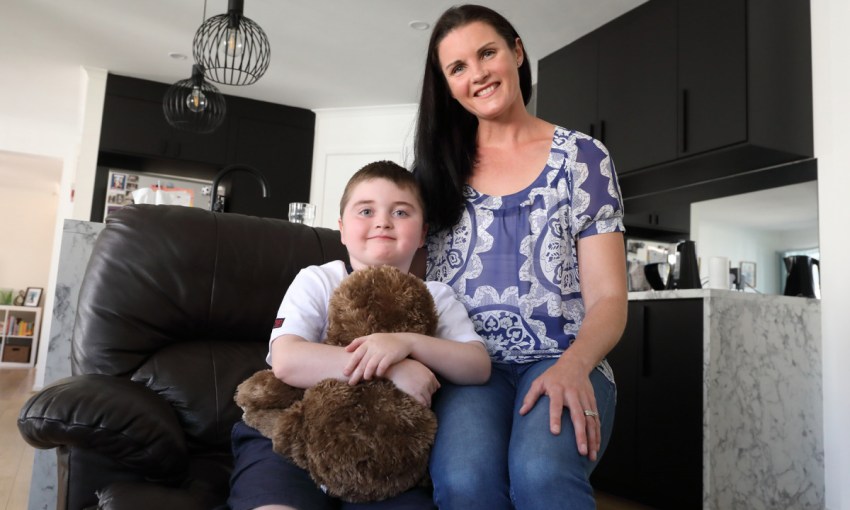Amanda O’Connor, 37, is a carer for her son Tyler who was diagnosed with Duchenne Muscular Dystrophy (DMD) just before his third birthday. Here she talks about her dream of becoming a mum, how the doctors once misread Tyler’s condition and her focus to live the best life for her family.
“I felt instinctively that there was something the doctors were missing”
I grew up at Hallett Cove Beach and my older sister and younger brother and I just lived at the beach. I was lucky to have such a happy childhood. My best friend lived across the street, we had a pet dog called Lucy and weekends consisted of walking down to the beach or local deli, playing at the school and sport.
I went to Seaview High School and got involved in dance, aerobics and Eisteddfods. As a teenager, I made new friends and started to experience what life had to offer; new friendships, love, heartbreak – all the normal teenage experiences. I was lucky I had understanding parents who let me try new things in the performing arts which was a big passion of mine throughout high school.
I wanted to be a dancer when I grew up, or a nutritionist, neither of which I pursued. After I graduated high school I found a job straight away in finance and stayed with the company doing many different roles until I was 26.
I always wanted to be a mum, so when I met Adam, a pest controller, we knew we wanted to start a family pretty quickly. Becoming a mum was the most pivotal moment in my life. When you have children life comes into perspective.
We were thrilled when Georgia came along in 2010 and then Tyler two years later.
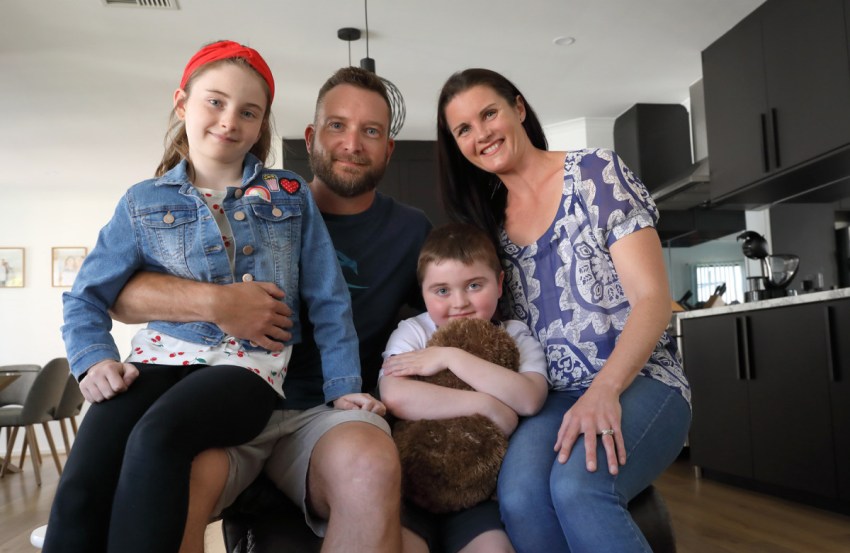
Adam and I had some concerns about Tyler’s mobility and strength as he didn’t seem to be meeting certain milestones the same as other boys his age. He then got a normal childhood virus but it made him very weak and his legs were giving out and it took him a couple of weeks before his walking improved. We took him to the hospital as we were very concerned. The doctors thought it was irritable hip and, because he wasn’t yet three, they kept telling us not to worry and that he would catch up.
But I instinctively felt that there was something the doctors were missing, especially seeing my nephew, who was 13 months younger, was already demonstrating greater mobility.
After 12 months of going back and forth to doctors, I had had enough and got a referral to the paediatrician who looked after Tyler when he was born. The paediatrician knew with a few basic tests that we needed to test for muscular dystrophy.
When they said they were testing for muscular dystrophy, all I knew was that this would mean a wheelchair for Tyler, but I didn’t know anything else about the condition. The diagnosis was so slow due to the lack of awareness around the condition, even in the medical community.
It took six long weeks to get the blood tests back confirming that it was Duchenne Muscular Dystrophy (DMD). It was just before Tyler’s third birthday. We were then referred on to the Women’s and Children’s Genetics Unit and from there the neurology department and so on.
DMD is a rapidly progressive form of muscular dystrophy that is more prominent in boys. It’s a genetic disorder which sadly has no cure. DMD is caused by a mutation in a gene which can be inherited in families or, like in our case, occurs in families without a family history.
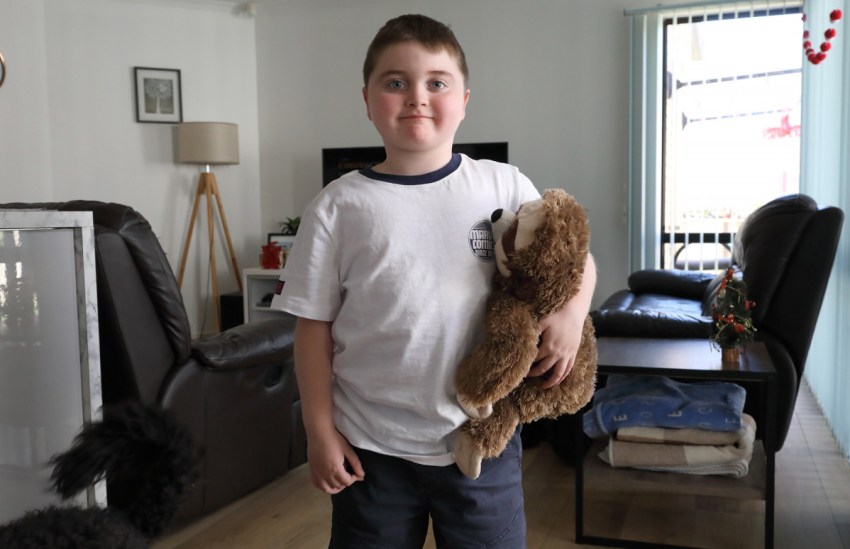
DMD is characterised by a progressive muscle degeneration and weakness and is caused by the absence of dystrophin, a protein that helps to keep muscles intact. Tyler’s muscle weakness leads to a noticeable waddling gait, difficulty climbing stairs or getting up and down from sitting positions and just generally keeping up with his mates. It has already affected the muscles of his hips, pelvic area, thighs and shoulders. Soon it will affect his skeletal (voluntary) muscles in his arms, legs and trunk. By Tyler’s early teens, his heart and respiratory muscles will also be affected and, devastatingly, most children with DMD don’t survive their mid-to-late 20s.
At first, Tyler didn’t understand what was wrong – he was too young. It was devastating for Adam and me, and our families. For me, I had a lot of guilt and you really grieve for the life you wanted him to have.
But Tyler is a bright, funny and easy-going seven-year-old boy who loves his superheroes, Roblox and mates. He is so brave and does so well with all he has to face.
His life consists of hydrotherapy twice a week, physiotherapy, occupational therapy, speech therapy and he also sees a developmental educator. We also have regular appointments with the neurologist, cardiologist, paediatrician, ophthalmologist and paediatric rehabilitation.
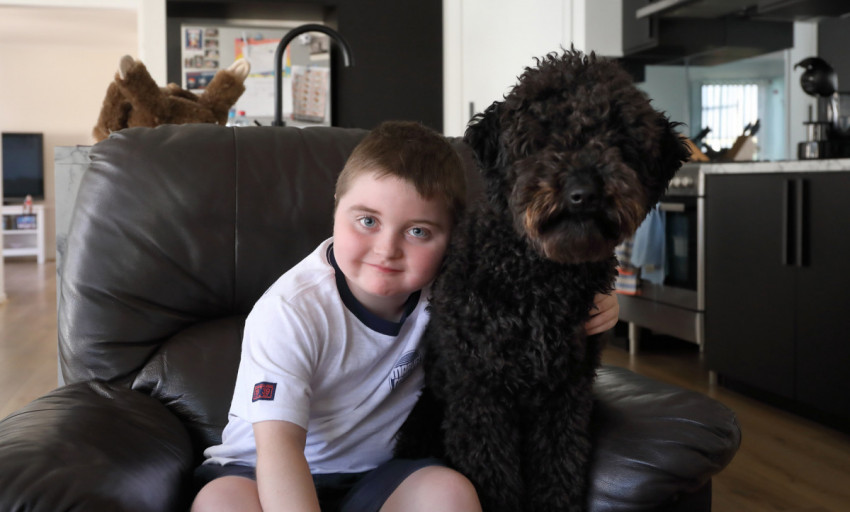
I try and look for a positive in every day and I look for support in my family and friends. I don’t do it well every day – sometimes it does wear you down – but I try to do something for myself like going to the gym, a walk or even just having a couple of quiet moments to reset, so then I can always be positive for us as a family.
Tyler is learning what it is like to have to live with DMD every day. It is a lot for a little boy to have to think about. He has lots of questions which we answer as best we can.
His mobility is starting to decline and he gets frustrated as he isn’t able to keep up with his friends, so now uses a powered wheelchair to help him keep up and join in. He has to take a mixture of medications which he does without complaint and wears night splints to help stretch the feet and leg muscles.
We are currently looking at taking Tyler off steroids as he is experiencing lots of side effects such as weight gain and insomnia.
What I have learnt about myself through Tyler’s journey is that I am stronger than I thought. I can deal with a lot because of what we have had to face, and I think I am a fighter. I fight for my family and I fight to make sure Tyler is getting what he needs to give him the best life possible.
What brings me the most joy is seeing my kids happy – it’s the best joy a mum can ask for.
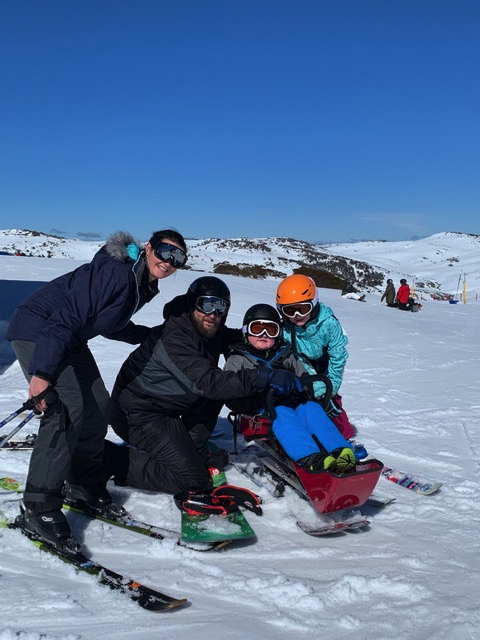
Today, I am very passionate about raising awareness for muscular dystrophy and making Tyler’s life as easy and comfortable as possible. I worry about what the future holds for Tyler as he continues on his DMD journey. I worry about how he will cope. How will his sister Georgia cope?
I’m inspired by all the parents out there who fight for their children who are sick or have an incurable illness. I know there are a lot of parents out there who have it hard and I feel motivated by them and their strength.
My advice to anyone starting out on a DMD journey is don’t be afraid to ask for help – there are many great organisations out there. Muscular Dystrophy SA (MDSA) has really helped us with information and support. You are stronger to ask for the help than not. Since the diagnosis, we’ve been to shows, camps, and all manner of events. It’s so valuable for Tyler, and it’s really great for him to feel so included.
Tyler goes to a mainstream school so it’s hard for the school to be truly inclusive; what the school thinks of as inclusivity is different to how those in the MDSA community think about inclusivity. Seeing others in wheelchairs through MDSA gives Tyler a sense of belonging. For him to be around kids going through something similar is extremely valuable, and it’s good for us to be able to talk to other families who relate to our situation.
At the moment we are looking forward to spending as many memorable family moments together as we can, living the best life possible.
If I could have one wish it would be to find a cure for all the boys and rare girls out there with DMD.



